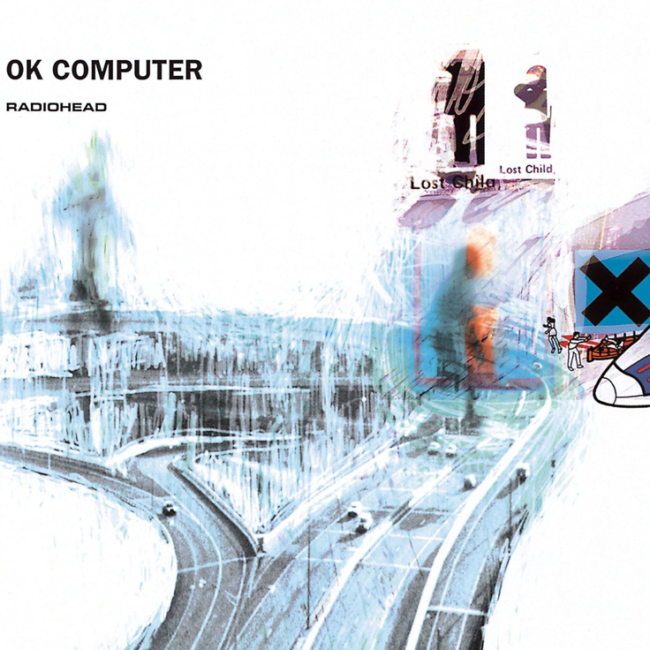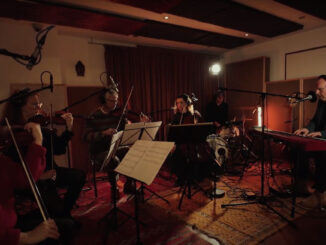
Radiohead’s “OK Computer” is 20 years old this spring. That statement is mind-blowing. Where did the time go? “OK Computer” is an album that the band’s record label foolishly dubbed career suicide, getting it utterly wrong, and it has become one of the most lauded and seminal albums of the late 20th Century. Endless reviews, theories and strange conspiracies have been spawned by this little album that could.
“OK Computer” would be overwhelmingly acclaimed by the critics, and many listeners and musicians consider it one of the greatest albums of all time. That may be laying it on a little thick but “OK Computer” is brilliant in capturing all the angst and foreboding lurking at the edge of the end of the 20th Century. Contextually this was a period where many of the preconceived norms of society were being weathered away by technology, and the manifest uncertainty of this occurrence was perfectly encapsulated in “OK Computer”. By ignoring their label, Radiohead would be rewarded for listening to their inner voice, presenting an off-kilter/introspective release that would capture the era’s zeitgeist.
“OK Computer” was the third studio album for Radiohead and the follow up to “The Bends“. “The Bends” was not the barn burning commercial success that their debut “Pablo Honey” had been. This was partly due to “The Bends” seeming to lack a catchy radio-friendly single like the legendary “Creep“. “The Bends” instead had been a steady slow-building release. Its commercial performance would eventually allow the band to score 100,000 British pounds worth of mobile studio equipment from their label on “OK Computer”.
There were several things that influenced the production of “OK Computer“. One significant event was the band’s participation in the War Child project. They got reacquainted with Nigel Godrich while working on producing the track “Lucky” for the project release. The song was a prototype for what the band wanted to produce on the soon to be conceived album. As frontman Thom Yorke stated, “Lucky was indicative of what we wanted to do; it was like the first mark on the wall.” Not surprisingly, their label Parlophone also voiced their desires for what they wanted on the next release. They indicated they were looking for “The Bends” version 2.0. Radiohead guitarist Ed O’Brien stated about that request, “Everyone said, “You’ll sell six or seven million if you bring out The Bend’s Pt 2, and we were like, ‘We’ll kick against that and do the opposite.” Early in the creation of the album the band would summons Nigel Godrich to help produce the release which would end up being a monumental decision. The band had worked with Godrich on songs for “The Bends” and after working together on the song “Lucky” realized that they worked well together with a mind-meld of sorts taking place. Godrich would play an important role in the album acting as co-producer, collaborator, managerial outsider, father confessor and mediator. At this point, after playing on the edges of the Radiohead inner circle, Godrich would become the unofficial sixth member of the band and has since had a hand in the production of every album to follow.
OK Computer was recorded at both Canned Applause, the band then camp out rough studio in Oxfordshire and St. Catherine’s Court in Bath. Radiohead moved to the last location when they decided that the Canned Applause studio was not working. Yorke believed the need to change studios was due to the band being too close to their homes which brought about a lack of productivity; Jonny Greenwood felt the need to change location was also greatly due to the lack of bathrooms and other conveniences at the studio making it an unworkable situation. The band legendarily took their time over the release, with two weeks alone being spent on the tracklist and a painstaking emphasis on quality over efficiency, eating up time. In recording the album, O’Brien estimates that 80% of the content was recorded with the band playing together and many of the vocals utilized were first takes. The band spun out the completion of the release fearing the label would be disappointed with the end result not meeting their expectations. The band, especially Yorke, believed they had a great release on their hands, but the critics would pan it for not being The Bends II. In hindsight, their risky decision to follow their muse was inspired and would keep them safe from the culling of musical acts that would take place just a few years later. With the success of “OK Computer” Radiohead would survive unscathed from the record label bloodletting soon to come and become a standard-bearer for musical creativity at the beginning of the 21st Century.
Success was far from assured in 96′; the label asked Radiohead to take a break from recording to support Alanis Morissette. Management and the band agreed to do this to put some financial goodwill in the tank for the band. Additionally, it would gain them some slack with the label executives who thought the band was walking to the end of the branch with a saw in hand on the new release. The tour allowed the band to work on perfecting songs for “OK Computer” and edit the early massive version of “Paranoid Android” that was timing in at 14 minutes. Upon delivering the album to Parlophone, the feedback returned to Radiohead’s management that “OK Computer” was deemed a non-starter by the label. Projected sales for the album were lowered. It was described as a career-ender for the band if released as it was delivered. The band stuck to their guns and refused to re-record.
Radiohead was soon to be vindicated with their first #1 on the UK Albums chart and a #21 slot on the Billboard 200, the band’s highest appearance at that time. The album would go platinum-selling millions and counting. Critics who had been lukewarm at best with initial offerings from Radiohead would go mad for the album. Before the year was out, the album would garner a Mercury Prize Award nomination, two Grammy Nominations, one for Album of the Year and winning the Grammy for Alternative Album of the Year and a nomination for Best Album of the Year in Britain. Real-life was suddenly mirroring the narrative of “Paranoid Android” with the underdog becoming king. To Radiohead’s credit, all the members have stated that maybe the critics went a little overboard praising “OK Computer”. The sudden turn of fortune for the band would overwhelm them, with success becoming more of a threat to the band than their belief that they would ever labour in obscurity.
So what is OK Computer all about, goodness knows there is an opinion for every person familiar and sometimes not so familiar with the release. That is the beauty of the album and what makes it so timeless. It is so multi-faceted and can come across differently depending on your viewpoint. I can only weigh in with what has struck me over time and rely on the lyrics and feel of the music recorded to base an opinion. I know there is a symbiotic relationship between Yorke’s lyrics, his genius and that of the other band members when creating this endeavour. The album is about civilization heading towards utter madness. It is a lyrical walkthrough of Yorke’s fevered dreams best expressed in “Let Down, Climbing the Walls and Subterranean Homesick Alien“. It addresses the question of what happens when we give into the computer age and its impact on our humanity. Many times Yorke is found debating the pros and cons of android vs humanity with wry and clever observations. Often Yorke seems to weigh in favouring the android, but he can’t be restrained from leaking his forlorn hope for humankind throughout. The members of Radiohead have always stressed that “OK Computer” was not a concept album but a contextual album, but they also created the album to be listened to in one pass. “OK Computer” can be appreciated without the context of the time, but understanding the context makes the release all the more redolent. This album was produced at a time when streaming, the iPod and the whole downloading phenomena were gaining speed. There was a definite feeling of standing on the edge that is so well expressed in the lyrics of “Lucky“. What is captured on “OK Computer” is a moment when all is pending; change is coming, be it good or bad, intentional or unintentional consequences would ensue, and that pause is akin to God’s pause before the battle commences. Like a Cassandra standing on the bridge, Yorke senses all the isolation to come and the ever-widening gyre of potential disaster it portents. Yet he plants a forlorn seed of hope ever so slim that it won’t be as dystopic as it seems.
On “OK Computer”, the overarching idea seemed to be that technology that had been seen as always positive would have significant drawbacks and not necessarily lead to Utopia but dystopia. The opening song of the album “Airbag” cleverly introduces the idea. The track also produced the perfect bridge from “The Bends“. The song was a hat tip to DJ Shadow with its 1970s double bass and took heavy inspiration from the Tibetan Book of the Dead and an article entitled, An Airbag Saved My Life. Yorke cut and pasted the article’s title into the lyrics, where he juxtaposed the eternal circle of reincarnation with the idea of being saved by a technological device. In this case, the airbag saves you from your dreadful driving skills. Here the airbag saves you rather than the” fill in the blank” deity of your beliefs. To make the point, Yorke utilized lyrics like, “In a fast German car I’m amazed that I survived an airbag saved my life, and In an interstellar burst I am back to save the universe” emphasizing the themes of the album. Sonically midway through the track, it turns into something more transcendent than the insistent guitar in the beginning. The outré prepares the listener for the next track with the chants and intergalactic cacophony that ends this song.
The epic “Paranoid Android” would blend sonic ideas from the Beatle’s “Happiness is a Warm Gun”, The Pixies and Queen’s “Bohemian Rhapsody” to come up with a later 90’s alt version of “Stairway to Heaven” with its unconventional structure earning lasting popularity. The title was taken from Douglas Adams’ “Hitchhiker’s Guide to the Galaxy” and was also informed by Yorke seeing a woman’s violent reaction to a spilt drink in a LA bar. There is a subtle undercurrent of desires for revenge on bullies and snobs, “When I am King, you will be the first against the wall… off with his head.” Also expressed is the idea of the favoured over those cast aside, a reflection of the works of Dante expressed in the final lyric, “God loves his children, God loves his children, Yeah.” As The Paranoid Android, Yorke is attempting to rationalize the madness he sees as something other than human. He expresses most emphatically that he might be paranoid or mad, but he himself is human; additionally, he observes that if what he witnesses in LA is success, he wants none of it. Take note of how Yorke sings so sweetly about the vilest behaviour with a wry, knowing tone. Sonically Jonny Greenwood takes off on the guitar midsection in a most incendiary manner. Also to be appreciated is the twist on the quiet/ loud structure made famous by the Pixies taken here to the nth degree. The song is mammoth modern-day rock opera.
Much has been made, probably a little too much about the alienesque theme of “Subterranean Homesick Alien“. It is an oversimplification to dwell on only that element when the song has many themes woven throughout. One thread is the antiseptic aspect of Middle-class life fleshed out in lyrics like “I live in a town where you can’t smell a thing”. Also expressed is the idea that as we mature, we shed our innocence and the ability to be emotionally expressive. We hide behind our facades or as Yorke calls it, become uptight, with aliens “Making home movies… of all these weird creatures who lock up their spirits.” Finally, the idea that when you veer from conformity, in this case, experiencing or yearning for an alien abduction, you might find yourself on a 72-hour hold in the nearest psychiatric ward, “I’d show them the stars and the meaning of life, they’d shut me away.” The track conveys a distinct forlorn regret for the hell humans bring upon themselves with enforced conformity. Sonically the lovely swirling guitar and interstellar atmospherics set the stage for a gauzy, almost psychedelic song. This dreamy feeling creates an emotionally removed feeling that perfectly meshes with Yorke’s terrestrial stream of conscious lyrics.
“Exit Music (For a Film)” was a song used in the end credits of the movie William Shakespeare’s Romeo and Juliet. The track is about how people should escape before the bad stuff happens. The song is a dialogue both inwardly and outwardly expressed between the two famous lovers. Eventually, they realize they have left things too late and find the only way out is suicide with the lyrics “We hope that you choke, that you choke”, cursing those who bring about their cruel fate. Overall, the song is an anthem against authoritarianism and conformity and is heartbreaking and haunting. The acoustic treatment, in the beginning, builds winding the tension and suspense and then breaks with a full band effect that seems to signify the oppressive forces against the couple. The song is simply epic.
“Let Down” has a goosebump producing intro of arpeggiated guitars and electric pianos. There is a wall of sound feeling as Jonny Greenwood plays at a different time signature from the rest of the band. Another backstage party inspired this song Yorke had experienced witnessing people worse for wear at the end of an evening. Partially a roman, a clef that contains autobiographical glimpses of the tour grind Yorke was encountering. In the lyrics are woven aspects of Kafka’s Metamorphosis with its insect imagery. This imagery is married to the desire to change and have the surroundings change and the letdown when that is not possible, “Crushed like a bug in the ground”. The need to deaden the disappointment with substances to continue existing, “disappointed people clinging on to bottles” is expressed. Also expressed is the regret with the transient nature of our modern life and how it destroys us little by little. But all is not lost the final verse relates to hope, ‘Floating, bouncing back and one day… I am going to grow wings,” alluding to the possibility of rising above all that is a letdown. Yorke produces one of his most evocative vocals on this track, making it spectacular and transcendent.
There are a few backstories to “Karma Police“. The song’s theme and title come from the band members using the catchphrase to apply to people who get what they have for their shitty behaviour. Additionally, illuminating is that the girl with the Hitler hairdo imagery came from Yorke’s encountering the diva behaviour of Justine Frishmann from the band Elastica while on a photoshoot for a music periodical cover. This allusion spoke to the madness of the UK music scene of the period. The song was directed at all the doubters, label executives and anyone who had ever given the band crap, “This is what you get when you mess with us”. The tasty wry observation of the track’s theme was equal parts realizing you shouldn’t bite the hand that feeds you no matter how much they earn their bad karma, and the satisfying idea of angered gods chucking lightning bolts at erring humans. This is illustrated in lyrics like, “I’ve given all I can it’s not enough, I’ve given all I can but we’re still on the payroll… for a minute there I lost myself.” The song’s rollicking piano and catchphrase lyrics begged to be sung along with and built the drama of the song to a great climax.
There is some disagreement about if “Fitter Happier” works on the album. I think it is necessary as it supports the underlying premise of the album. The lyrics seem to be a laundry list of how to perfect yourself and become almost machine-like in behaviour. If only you follow the advice; how often to go to the gym, eating well, drive a safer car and get sufficient sleep, etc., you can be perfect. Found in the ellipsis of the song’s lyrics are all the things that have to go if that result is going to happen; no more microwave dinners, no bad dreams, etc. All the modern-day insanity of the world is exposed on this track. It includes inane self-help guru advice, woman’s magazine wisdom and unattainable societal expectations that drive dissatisfaction and self-hate. These pieces of advice seem well-intended but spiral into malevolent conformity killing human spark and individuality, producing a soulless android. There is something just short of genius in the band’s use of the Apple computer vocal app. named Fred to vocalize the lyrics bringing to life the android. The accompaniment is like entering a discordant disturbing dissociative nightmare; it is a terrifying track.
It is safe to say that “Electioneering” is the most political of the tracks on the release. There can be little argument that Yorke hit the bull’s eye when describing the futility and uselessness of politics then and now. No matter your political persuasion, this song encapsulates the situation using these classic lyrics; “I will stop, I will stop at nothing. Say the right things when electioneering, I trust I can rely on your vote… when I go forwards, you go backwards and somewhere we will meet.” The venom expressed by Yorke in the song reveals all the frustration and anger of civilization ever weary of the same shit new day. The sonics are a full-on attack with an excellent cowbell. The cacophony, especially at the end, reminds me of The Smith’s “Meat is Murder”; “Electioneering” is a timeless seminal political song.
“Climbing the Walls” is a song that still scared the stuffing out of me. It is a sinister dark song influenced by Yorke’s experiences working as an orderly in a mental hospital and an article he read in the NY Times about serial killers, so lighthearted stuff it is not. The stringed arrangements were created by Jonny Greenwood for 16 instruments and inspired by his hero Krzysztof Penderecki’s Threnody to the Victims of Hiroshima. Yorke captures the deranged “word salad” speak of paranoid, sociopathic and manic individuals. The sounds of madness, a schizophrenic episode captured, dissociative and threatening, heightened by Yorke’s primal screams towards the end of the track. The song takes full advantage of each listener’s imagined boogiemen and fears to bring off a visceral feeling that is bone-chilling and haunts your soul, “and either way you turn, I’ll be there, Open up your skull, I’ll be there climbing the walls”.
The tone seems to turn lighter with the happier sounding “No Surprises” but that gets turned on its head very quickly. This tribute to Midlife ennui is, as Thom Yorke has put it a “Fucked up fairy tale.” The grim realization that you’re hanging by your fingernails as life passes by, “A job that slowly kills you with bruises that won’t heal.” The dreams that will never come to fruition create the desire to opt for “…take the quiet life a handshake with carbon monoxide… no alarms, and no surprises.” The narrator is begging to be desensitized to all the disappointments but also desiring a way to escape. This song is almost as terrifying as “Climbing the Walls” because of Yorke’s accurate description of how despairing the realization is that we waste so much time on things that do not matter. Also of note is that when Yorke is at his most angelic vocally, that is exactly when he is his most venomously insightful. This occurrence is on full display with this brilliant track.
“Lucky” was initially written about the Bosnian War. Here is found the irrepressible hope of humankind. Revealed is that belief that luck can change in the direst of circumstances “I’m on a roll; this time, I feel my luck could change”. The lyrics also refer to the arbitrary luck of surviving a disaster and foolishly thinking it is due to anything other than fickle fate having a hand in the outcome. There is a pragmatic triumphant vibe throughout, which builds the drama. “Pull me out of the air crash, pull me out of the lake, ’cause I’m your superhero.” The soaring guitars and pathos of the lyrics make for a transcendence that, when played live, is extraordinary. Musically there is a flash of Pink Floyd in the end outré making the last 50 seconds breathtaking; it is my favourite song on “OK Computer“.
“The Tourist” was inspired by Yorke watching frantic American tourists trying to cram into their tour as many tourist attractions in Paris as possible. It is also Yorke’s confession that he needed to slow down and his mea culpa admission to impatience and needs for control, “Idiot, slow down, slow down… you ask me where the hell I’m going at a thousand feet per second”. The underlying emphasis is that we are all just passing through in life, slow down, and make the most of it. The song additionally pleads for all of us to slow down and consider all of the potential dangers of our future and choose wisely how to best address them. The sonic feeling of the song was flyblown and folksy. The track is a brilliant ending to a timeless classic that encapsulated the zeitgeist of an era.
With the release of “OK Computer“, the fortunes of Radiohead were changed almost overnight. The album was a significant step up the podium to their now legendary status. They were on a roll and had proven the music executives of the time had nary a clue what would be successful in the popular music world. Here is also where the band turned from being an obscure alternative band to the designated observer and pulse taker of civilization’s fevered insanity. The album struck a chord throughout the world because it provided a companion to anyone who dissented or saw the reality behind the façade. The release let them know they were not alone. The members of Radiohead observed the madness of our society and attempted to make order out of the chaos. That impossible task was overwhelming and would drive Yorke and at least one other band member to the brink of madness and nervous breakdown. The band members would survive and produce some of the most extraordinary sounds in future releases. In the eyes of many enthusiasts and critics, they have ultimately placed themselves on a level few other bands have attained. With “OK Computer“, Radiohead had advanced forward with stunning resolve turning from the Grunge and Britpop genres of the day to create their own breathtakingly seminal concoction. Happy 20th birthday, OK Computer. We are all the better for your existence.





Be the first to comment